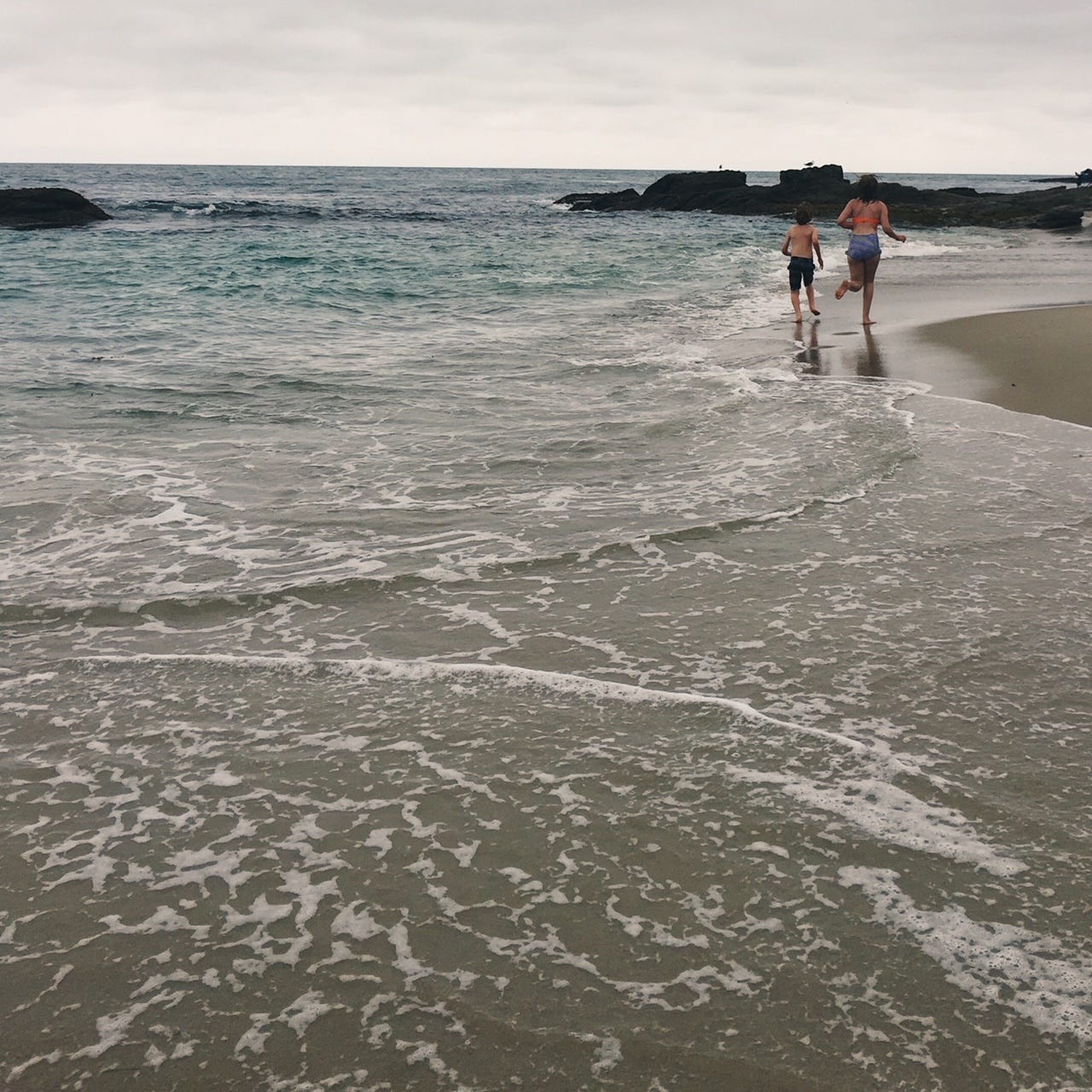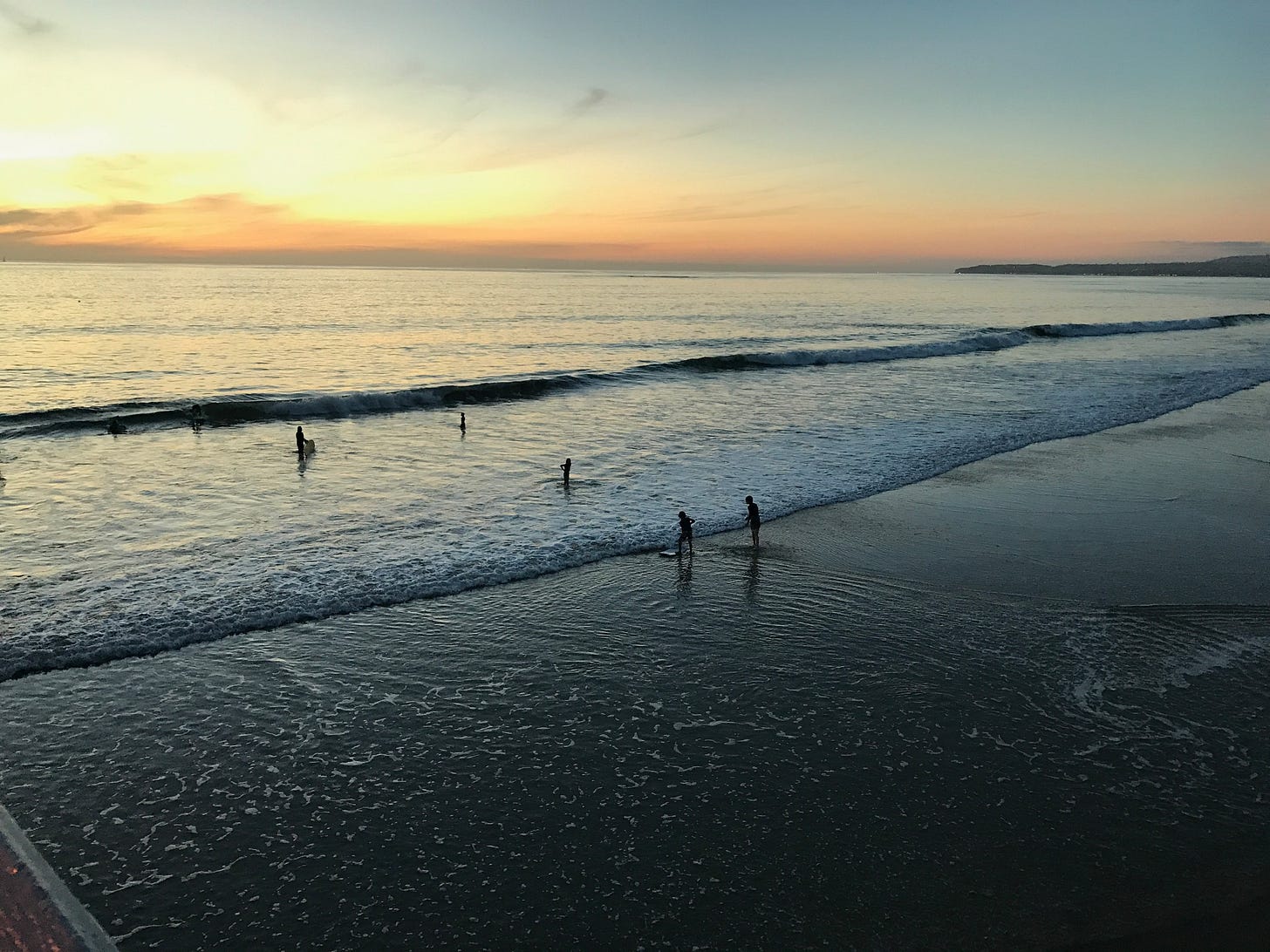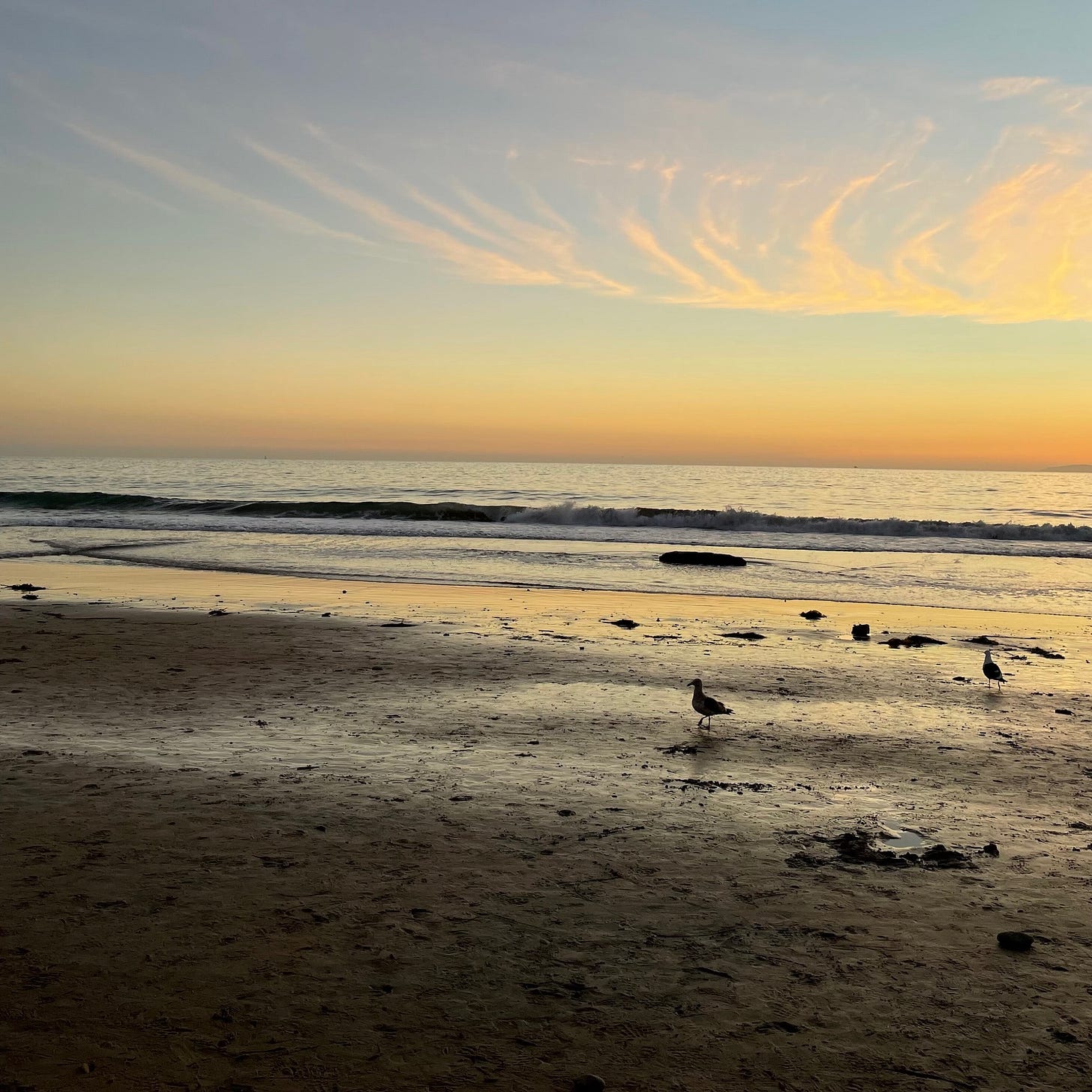We were sitting on a bench facing the ocean, so it made sense for this man to ask me, “Do you enjoy being in the water?” He had no way of knowing I never have an answer for this question. As for the “No, not really…” part of me, for one, the water is usually very cold, true to form for the Pacific. But on the other hand, the ocean is a cool seductress, and when I walk straight into her icy foam, she both coaxes me deeper and threatens to overwhelm me. Then there are the sharks, and they’re all over, impossible to see beyond my goosebumps. My daughter had me watching Soul Surfer ten too many times which doesn’t help. But the salt on my skin and the rush of the surf wrapping around me on a warm day changes my answer to a swoony, “Yes, I do.” I am terrified of her depths; I am romanced by her depths.
Sixth grade was the first time I fell in love with a chapter book, so by the time the main character, a girl my age, drowns when a rope swing she uses to cross the creek snaps, I was deeply invested. The character’s name was Leslie. In 11th grade, I read The Awakening by Kate Chopin, where at the end of the book, Edna, depressed and disillusioned, walks into the sea for a swim. She swims beyond the point where she’ll have the strength to make it back and drowns. In twelfth grade, I chose Virginia Woolf as my favorite author about whom I’d write a 15-page paper. I don’t remember if I knew at the time that I chose her the way she filled her pockets with rocks before submerging herself in a river in Yorkshire.
Do I enjoy being in the water. Enjoy might be the wrong word.
Last year, I ran into a friend, and upon seeing her, I recalled that the year prior, we’d exchanged several messages about her difficult marriage. Back then, I tried to assess her safety, pressing gently with questions and careful input; she eventually disengaged, giving tidy quips that told me she wasn’t at a place to face some of the painful realities in her home, much less decide what to do about them. Sometimes we work so hard to keep the ship afloat, we forget to keep our eyes up in search of safe harbor; I know those dizzying, dark tides well. So when our paths crossed, I looked in her eyes, hoping for evidence she’d found some dry land. But she seemed disoriented, seasick. I asked a sincere, “How have you been?” Her reply, in a forced, shrill tone, was, “Oh, I’m just praying for Jesus to come back!” followed by laughter. I held her gaze; I did not laugh.
Reader, this is Christian code for wanting to die. It’s something I’ve said in the past, in this exact way, under these same circumstances, when I’ve been flattened by emotional pain. In many communities, it is an accepted and even encouraged fantasy to pray and try to hasten your own end via the doctrine of the second-coming, the belief that one day, Jesus will come back to rescue us. I won’t address the theology here, simply the way this belief is often used. I want you to know this is a religious death-fantasy, and I want you to understand it means someone wants their life, as they know it, to be over. It means someone is drowning.
Let me make one distinction. There is a noteworthy difference between being suicidal and wanting your life to be over. So far, I’ve never experienced suicidal ideation; I’ve never considered finding a way to take my own life. But there have been times, seasons even, when I’ve felt so devastated, so terrified, and so cornered that “Jesus coming back” seemed to be the only way out of that pain. I’ve also known several friends who have expressed a longing for death (as opposed to a desire to act on it) as an escape from a consuming, unceasing pain. For me, I reeled most during the darkest parts of my marriage. As an aside, in case even one person reading this finds themselves sinking in those same stinging seas, what I wish someone had given me permission to do was simply leave the relationship. I know it’s complicated, but if I may make things exceedingly simple, you are allowed to leave a person who is harming you. The question isn’t, “Are things bad enough?” The question is, “When will you agree that your name is Beloved?”
What deserves a whole essay of its own is the plain fact that in many religious circles, ways to talk about suffering are scarce and often shameful. It’s one reason why women in particular resign to emotional encryption, nervous laughter, and spiritual bypassing as acts of social survival. My suffering should never have been a secret. Please decode yours for someone safe.
Back to today, and the world feeling more and more like a dystopian landscape we’ve only ever read about in English class, I’m afraid that some of us are slowly walking the beach and putting rocks in our pockets. These last few months, I imagine we have turned smooth stones in our hands and slipped them onto the top of the pile, unseen. Maybe we don’t have plans to walk out into the sea with them. And maybe we do. But friend, either way, I’m with you: that shit is getting heavy.
Do I enjoy being in the water? Maybe the best answer is what’s tattooed on my wrist, two words printed like an old typewriter scarred me with the letters: not yet. It’s an answer tinged with curiosity and maybe hope. What I really want is for someone to teach me how to swim in the waves, because that’s a learned skill, and I’m too scared to go it alone, not with those yellow flags flying atop the lifeguard station. What I need is someone else to keep their eyes on me. I need a hand to grab mine and pull me out of the whitewater if necessary, and that takes someone acquainted with the breakers. Someone who’s survived and can look you in the eye about it.
Last night I met someone who has and can. I had this essay written up to this point, and then Levi the Poet, preached poetry at his show in San Diego. The moon last night, like a tilted, golden bowl low and glowing, dragged the tide through the dark, as Levi drew out tears with a similar magic. He is a man acquainted with grief, and he ended his multi-media poetry performance with what I found later emblazoned on the tees and red beanies dotting his merch table, two words: Don’t sink. It dovetailed so well with what I was already writing. And still, there is the issue of the rocks.
I offer these one-on-one SoulCare sessions, and really I’m just out here, paddling, having survived a few things, and I can look you in the eye about it. My passion is to support people as they navigate the depths of destructive relationship, divorce, co-parenting, faith deconstruction, and more. To pull out and examine a few smooth stones is also why I started searching for a therapist myself last week, a bit desperate for new tethers. I think if we can find the vulnerability to empty our pockets and grab each other’s hands, we might, on a warm day, enjoy being in the water.
You are the Beloved,
Leslie
Follow Levi on Instagram here
Reply to this email or DM me on Instagram if you’re interested in finding out more about SoulCare.










I wished to have God erase me every day of my life from my early teens until a breakthrough in therapy in my late 30s. I never thought there was anything concerning about that because if you DIDN’T always wish to be in heaven with Jesus, my spiritual leaders and friends thought there was something wrong with your faith. Thank you for speaking up about this tragic aspect of Christian culture.
I’ve never heard anyone else say that hyperfixating on Jesus coming again is a sign that the person no longer wants to be here. It’s validating and comforting to see that written out, so I know I’m not crazy! I was and still am deeply affected by someone close to me obsessing over the rapture since I was a child. Children are perceptive, and I was no different. I knew they didn’t want to be here anymore. 💔